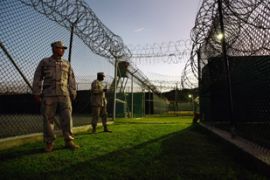Study faults Guantanamo death probe
Minimum standards ‘not met’ in investigation into alleged suicides of three detainees.

Unanswered questions
But questions have been raised about the official account of the way the men took their own lives. The military says that the men braided nooses for themselves, tied their hands and feet together, climbed onto their sink in their cells, and hung themselves.
The three bodies reportedly hung in their cells for two hours before being discovered, despite the cells being under video and guard supervision. When they were found, each man was also discovered to have “a rag obstructing his throat”, the study says.
Researchers from the US university ploughed through thousands of pages of documents, but they were so heavily redacted by government censors that it was impossible to build a clear account of what happened on the night of the deaths.
In the aftermath of the deaths, journalists and lawyers were ordered off the Guantanamo complex. But the report reveals that rather than pursue a thorough investigation into what had happened, the guards on duty were not ordered to provide sworn statements of the night’s events.
In addition, no-one was disciplined for the failings that allowed the deaths to happen, although some guards were warned that their original statements were believed to be false.
“Both the time and the exact manner of the deaths remain uncertain and the presence of rags stuffed in the detainees’ throats is unexplained,” the report says, adding that the deaths raise “serious questions that must be addressed to dispose of rumours that have circulated – rumours that the cause of the deaths was more sinister than ‘asymmetrical warfare'”.
The publication of the study has prompted human rights groups to demand the release of unredacted versions of the documents.
“Whatever the cause, there should be no confusion about the deaths of prisoners in US custody,” said Andrew Prasow, senior counsel with Human Rights Watch’s Terrorism and Counterterrorism Program.
“The military reports should be released in full so the public can be confident in the nature and scope of the investigations,” he said.